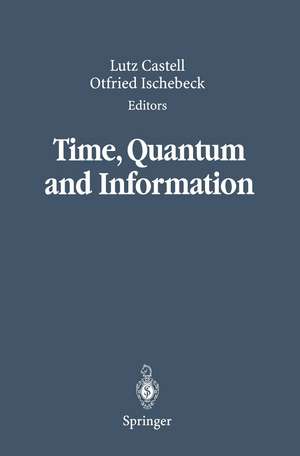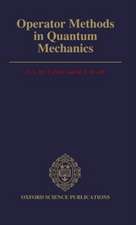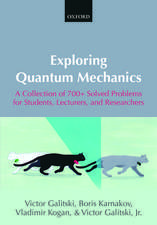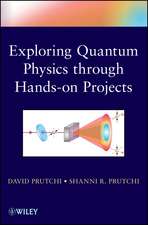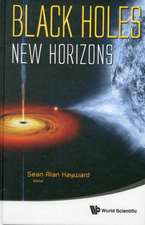Time, Quantum and Information
Editat de Lutz Castell, Otfried Ischebecken Limba Engleză Paperback – dec 2010
| Toate formatele și edițiile | Preț | Express |
|---|---|---|
| Paperback (1) | 648.89 lei 6-8 săpt. | |
| Springer Berlin, Heidelberg – dec 2010 | 648.89 lei 6-8 săpt. | |
| Hardback (1) | 655.60 lei 6-8 săpt. | |
| Springer Berlin, Heidelberg – 12 aug 2003 | 655.60 lei 6-8 săpt. |
Preț: 648.89 lei
Preț vechi: 763.40 lei
-15% Nou
Puncte Express: 973
Preț estimativ în valută:
124.22€ • 127.82$ • 104.71£
124.22€ • 127.82$ • 104.71£
Carte tipărită la comandă
Livrare economică 01-15 martie
Preluare comenzi: 021 569.72.76
Specificații
ISBN-13: 9783642078927
ISBN-10: 3642078923
Pagini: 472
Ilustrații: XIV, 454 p.
Dimensiuni: 155 x 235 x 25 mm
Greutate: 0.65 kg
Ediția:Softcover reprint of hardcover 1st ed. 2003
Editura: Springer Berlin, Heidelberg
Colecția Springer
Locul publicării:Berlin, Heidelberg, Germany
ISBN-10: 3642078923
Pagini: 472
Ilustrații: XIV, 454 p.
Dimensiuni: 155 x 235 x 25 mm
Greutate: 0.65 kg
Ediția:Softcover reprint of hardcover 1st ed. 2003
Editura: Springer Berlin, Heidelberg
Colecția Springer
Locul publicării:Berlin, Heidelberg, Germany
Public țintă
ResearchCuprins
I Carl Friedrich von Weizsäcker and His Role in the Physics of the 20th Century.- Carl Friedrich von Weizsäcker and The Kaiser Wilhelm/Max Planck Society.- The Role of the Physicist in the Nuclear Age.- “The Atomic Bomb Reveals the Political Responsibility of Science”.- On the Unfathomableness of Consciousness by Consciousness.- II Carl Friedrich von Weizsäcker’s Contributions to Nuclear and Astrophysics and Their Impact on the Development of Physics.- Introduction: From the Atomic Nucleus to Cosmic Vortex Systems.- The Origins of Nuclear Physics and Carl Friedrich von Weizsäcker’s Semi-Empirical Mass Formula.- Thermonuclear Processes in Stars and Stellar Neutrinos.- Comets: Fascinating Cosmic Objects.- The Spectrum of Turbulence.- From Dust Disks to Planetary Systems.- III The Unity of Nature and the Nature of Time.- Science and Its Relation to Nature in C.F. von Weizsäcker’s Natural Philosophy.- C.F. von Weizsäcker’s Philosophy of Science and the Nature of Time.- What Is Missing? — The Fundamental Role of Time in C.F. von Weizsäcker’s Conception of Physics and Some Insights from Modern Neuroscience.- Irreversibility via Semichaos.- Remarks on Fractional Time.- The Dynamics of Modelling.- IV The Structure of Quantum Theory and Its Interpretation.- An Introduction to Carl Friedrich von Weizsäcker’s Program for a Reconstruction of Quantum Theory.- Interpreting Quantum Mechanics — in the Light of Quantum Logic.- On the Interpretation of Quantum Theory — from Copenhagen to the Present Day.- Epistemic and Ontic Quantum Realities.- Information and Fundamental Elements of the Structure of Quantum Theory.- Multiple Quantization in Fock Space.- V The Ur-Hypothesis and Its Implications for Particle Physics and Cosmology.- The Ur-Hypothesis.- TheMomentum Eigenstates and the Lorentz-Invariant State.- C.F. von Weizsäcker’s Reconstruction of Physics: Yesterday, Today, Tomorrow.- The Operational Structure of Spacetime.- Ur Theory and Space-Time Structure.- Weizsäcker’s Ur Theory — A Cosmological Point of View.- Ur Theory and Cosmological Phase Transition.- Phase Transitions in an Expanding Universe: Paul Roman’s Models and Some Remarks on Entropy.- C. F. von Weizsäcker: Biographical Data and Selected Bibliography in Physics.- The Authors.
Textul de pe ultima copertă
This collection of essays presented to Carl Friedrich von Weizsäcker on the occasion of his 90th birthday addresses a wide readership interested in astronomy, physics, and the history and philosophy of science. The articles treat subjects such as the social responsibility of scientists, thermonuclear processes in stars and stellar neutrinos, turbulence and the emergence of planetary systems. Furthermore, considerable attention is paid to the unity of nature, the nature of time, and to information about, and interpretation of, the structure of quantum theory, all important philosophical problems of our times. The last section describes von Weizsäcker's ur-hypothesis and how it will theoretically permit the construction of particles and interactions from quantized bits of information.
